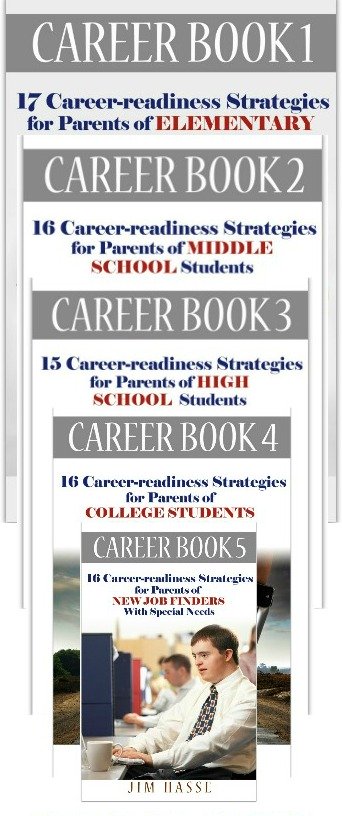Motivated kids:
Cerebral Palsy
Career Builder for Elementary School
By Jim Hasse, ABC, GCDF, Disability Employment Expert
_________________________________________________________
Motivated kids thrive on encouragement, love, learning and conversation with you, as a career-coaching parent. Those positive experiences are especially important for your elementary student with cerebral palsy (CP).
My little successes
During my early grades, my mom seemed like she was always helping me prepare for the day when I could live an independent life. In fact, as I look back, I can trace my “entrepreneurial spirit” back to her tutorage. I remember her helping me:
- Plan and plant
an herb garden every year while I was in grade school so I could give
not-so-common herb samples to my school teachers, neighbors, house parents etc. every
holiday season.
- Make a variety
of reed baskets by soaking the reeds in our upstairs bathtub and turning the
bathroom into a mini-manufacturing room from which I gave (and sometimes sold)
examples of my handiwork.
- Learn
photography and the difference between a photo essay and photo story through my
photography project in 4-H.
Those little successes (which I still vividly recall six decades later) gave me the motivation to eventually tackle the mainstream job market and start my own business, even though I had CP.
Motivated kids have an internal desire or need that energizes their lives and gives them direction. Many believe that it is more important than natural ability or aptitude. But, no one has really discovered how an individual acquires personal motivation, writes Geoff Colvin in his book, "Talent Is Overrated: What Really Separates World-Class Performers from Everybody Else " (Penguin Group, 2010).
State
of Oregon school psychologists admit that, at some point in your youngster’s development,
you will probably feel that your youngster lacks sufficient motivation. Most
parents face this worry that their son or daughter kid is not motivated.
Different
"signs" may trigger this concern. Your youngster may seem turned off
by everything, may complain excessively about school or home life, may drop out
of activities, or act particularly bored with routine and non-routine events.
It’s important not to react in ways that might actually make the problem worse. After all, encouragement, not criticism, inspires us all, particularly motivated kids. When you criticize even constructively, your youngster is often discouraged and less motivated to do what is expected.
To this day, I remember my mom saying,” You’re not doing well today with your speech,” because I internalized what I took as criticism. I have difficulty recalling when she said, “You’re speech was particularly clear today.”
Describe the reaction in your child
when you’ve said, “You’ve done well!”
Join PACER’s Facebook discussion.

When motivated kids do well
On the other hand, by noticing and encouraging good behavior, youngsters typically repeat that good behavior. Motivated kids feel good about themselves, their behaviors improve as the improvements are recognized, and their motivation increases.
All motivational problems are not simply solved, of course, and can require professional help. But, you, as a career-coaching parent, can make a huge impact by focusing on and supporting what your youngster does well.
In
addition to providing encouragement, parents of motivated kids who do well in
elementary school or outside activities tend to:
- Show love by providing support for youngster as they develop their interests.
- Teach responsibility by acknowledging positive behavior in completing chores, completing homework and participating in social activities.
- Be a role model by valuing education, exhibiting family values and modeling expected behavior.
- Provide a range
of experiences through sports, music, volunteer activities, and travel so
youngsters discover and develop their strengths, bolster their self-confidence
and acquire the motivation to do more.
- Talk to their youngster
about activities, schoolwork, friends, and interests as well as listen as he or
she discusses these topics.
- Be aware of potential issues by recognizing the general problems and pressures their youngster may face (and need help with) while facing the challenges of growing up.
Of course, growing up with CP means your youngster will probably face a whole range of other challenges specific to CP.
So, cultivating an open dialogue about those specific issues and how to resolve them as well as about general “growing up” questions can often be critical in determining how effectively your youngster makes the eventual transition from school to work.
Describe the reaction in your childwhen you’ve said, “You’ve done well!”
Join PACER’s Facebook discussion.
Return
from Motivated Kids to Job Titles
Go
to Cerebral Palsy Career Builders
This is Creative Commons content. You can freely and legally use, share and repurpose it for non-commercial purposes only, provided you attach this sentence and the following attribution to it (including the two links):
Originally written and illustrated by Jim Hasse, ABC, GCDF, owner of Hasse Communication Counseling, LLC, who, as a person with cerebral palsy, served for 10 years as a vice president in a Fortune 500 company during his 29-year career in corporate communication. He’s an Accredited Business Communicator, certified as a Global Career Development Facilitator and author of 14 Amazon books about disability awareness and disability employment issues.





